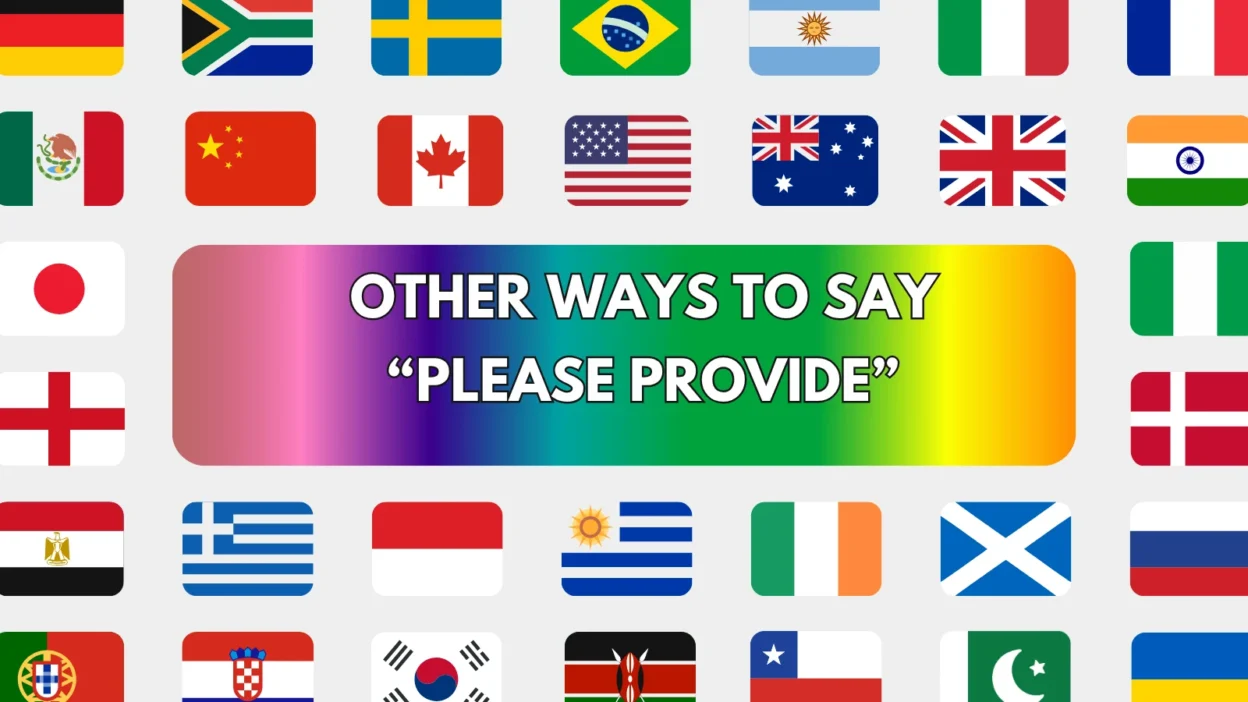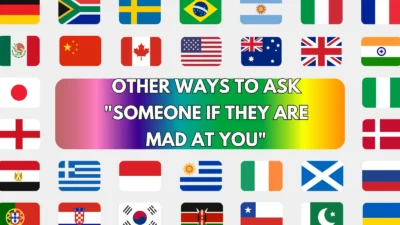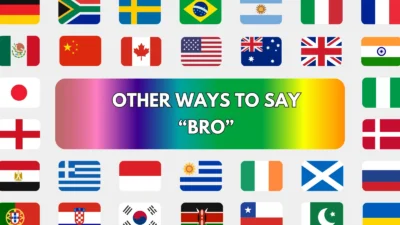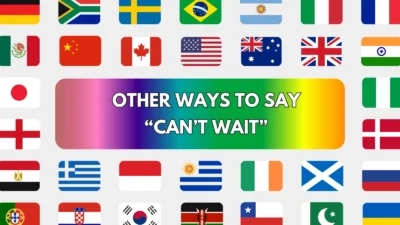The phrase “please provide” is commonly used in emails, work messages, and formal requests. While it’s clear and polite, using it too often can sound repetitive or overly stiff. Whether you’re asking for documents, feedback, or information, there are many other ways to make your requests sound professional yet natural.
Below are 25 thoughtful alternatives to “please provide” — complete with meanings, detailed explanations, examples, and tones to help you choose the right one for your situation.
1. Could you send me…
Meaning: A polite way to ask someone to share or deliver something.
Detailed Explanation: Sounds less demanding than “please provide” and feels conversational.
Scenario Example: Could you send me the updated report by tomorrow?
Best Use: Emails, messages, and team communication.
Tone: Polite, friendly.
2. Would you mind sharing…
Meaning: Requests information gently and respectfully.
Detailed Explanation: Adds courtesy and softens the tone.
Scenario Example: Would you mind sharing the client’s feedback from last week?
Best Use: When you want to sound humble and considerate.
Tone: Courteous, respectful.
3. Please share…
Meaning: Direct but still polite.
Detailed Explanation: Simpler and more natural than “please provide,” commonly used in business writing.
Scenario Example: Please share the final version of the proposal once ready.
Best Use: Internal emails, formal messages.
Tone: Professional, polite.
4. Kindly send…
Meaning: A soft and respectful way to request information or documents.
Detailed Explanation: Adds warmth and formality without being too stiff.
Scenario Example: Kindly send the invoice by end of day.
Best Use: Formal or international communication.
Tone: Polite, formal.
5. I’d appreciate it if you could…
Meaning: A polite and appreciative way to ask for help.
Detailed Explanation: Expresses gratitude in advance, which builds goodwill.
Scenario Example: I’d appreciate it if you could forward the meeting notes to me.
Best Use: Formal or collaborative requests.
Tone: Respectful, professional.
6. When you get a chance, please…
Meaning: A relaxed way to request something without urgency.
Detailed Explanation: Shows patience and respect for the other person’s time.
Scenario Example: When you get a chance, please send me the updated figures.
Best Use: Friendly emails or peer communication.
Tone: Casual, kind.
7. Can you please share…
Meaning: A straightforward yet polite way to ask for something.
Detailed Explanation: Commonly used in both formal and informal work settings.
Scenario Example: Can you please share the latest project timeline?
Best Use: Professional communication.
Tone: Polite, direct.
8. I’d be grateful if you could…
Meaning: Expresses gratitude while making a formal request.
Detailed Explanation: Shows appreciation and humility.
Scenario Example: I’d be grateful if you could send over the signed contract today.
Best Use: Emails to clients, supervisors, or formal settings.
Tone: Respectful, formal.
9. May I have…
Meaning: A polite, traditional way to ask for something.
Detailed Explanation: Works well when addressing superiors or customers.
Scenario Example: May I have a copy of the final report, please?
Best Use: Formal or courteous communication.
Tone: Polite, professional.
10. Please attach…
Meaning: Specifically requests a file or document.
Detailed Explanation: Direct and clear, ideal for written communication.
Scenario Example: Please attach the budget file with your next email.
Best Use: Emails, documentation.
Tone: Professional, concise.
11. Could you forward…
Meaning: Asks someone to resend or direct information.
Detailed Explanation: Perfect when asking for emails or messages shared earlier.
Scenario Example: Could you forward me the client’s email chain for reference?
Best Use: Office communication.
Tone: Polite, neutral.
12. I’m requesting…
Meaning: Formal phrase for professional or legal contexts.
Detailed Explanation: Clearly expresses the purpose of your message.
Scenario Example: I’m requesting a copy of the signed agreement for our records.
Best Use: Official correspondence or records.
Tone: Formal, assertive.
13. Please include…
Meaning: Requests the addition of something specific.
Detailed Explanation: Ideal when you want to ensure completeness in documents.
Scenario Example: Please include the latest sales data in the presentation.
Best Use: Project instructions, reports.
Tone: Professional, straightforward.
14. Kindly provide me with…
Meaning: Polite and formal version of “please provide.”
Detailed Explanation: Adds a respectful tone, often used in business or customer communication.
Scenario Example: Kindly provide me with your availability for next week’s meeting.
Best Use: Formal requests.
Tone: Respectful, formal.
15. I’d love to receive…
Meaning: Adds warmth and friendliness to your request.
Detailed Explanation: Works well when you want to sound personable and positive.
Scenario Example: I’d love to receive your feedback on the new campaign.
Best Use: Collaborative or creative settings.
Tone: Friendly, upbeat.
16. At your earliest convenience, please…
Meaning: Asks politely without imposing urgency.
Detailed Explanation: A classic formal phrase that gives flexibility to the recipient.
Scenario Example: At your earliest convenience, please share the finalized report.
Best Use: Business or client correspondence.
Tone: Polite, formal.
17. When possible, please send…
Meaning: Requests something with a flexible deadline.
Detailed Explanation: Keeps the tone considerate while still asking clearly.
Scenario Example: When possible, please send the revised proposal for review.
Best Use: Polite follow-ups.
Tone: Gentle, professional.
18. If you could provide…
Meaning: Conditional phrasing to make requests sound softer.
Detailed Explanation: Less direct and more considerate than a command.
Scenario Example: If you could provide the updated figures, that’d be great.
Best Use: Work requests, polite reminders.
Tone: Professional, respectful.
19. Can I get…
Meaning: Informal way of asking for something.
Detailed Explanation: Casual and conversational, best used with peers.
Scenario Example: Can I get the meeting slides from yesterday?
Best Use: Friendly team environments.
Tone: Casual, relaxed.
20. Please furnish…
Meaning: A formal way of saying “please provide.”
Detailed Explanation: Common in legal, governmental, or contractual documents.
Scenario Example: Please furnish a copy of your identification for our records.
Best Use: Legal or official communication.
Tone: Formal, precise.
21. I’d like to request…
Meaning: Direct yet polite request form.
Detailed Explanation: Sounds formal but approachable.
Scenario Example: I’d like to request your approval for the updated plan.
Best Use: Professional emails, formal documentation.
Tone: Respectful, formal.
22. Please make sure to include…
Meaning: Ensures important details aren’t missed.
Detailed Explanation: Useful in instructions or checklists.
Scenario Example: Please make sure to include all attachments before sending.
Best Use: Workplace directions.
Tone: Polite, instructive.
23. I’d be thankful if you could…
Meaning: A sincere and kind way to ask for something.
Detailed Explanation: Emphasizes gratitude in your request.
Scenario Example: I’d be thankful if you could send me the final edits today.
Best Use: Polite or client-facing communication.
Tone: Grateful, professional.
24. Whenever you have a moment, could you…
Meaning: A gentle, low-pressure way to request.
Detailed Explanation: Respects the recipient’s time while still making a clear ask.
Scenario Example: Whenever you have a moment, could you email me the updated schedule?
Best Use: Friendly, team-based communication.
Tone: Relaxed, considerate.
25. I’m hoping you can send…
Meaning: Expresses a hopeful tone instead of a demand.
Detailed Explanation: Makes requests sound positive and approachable.
Scenario Example: I’m hoping you can send the photos before Friday.
Best Use: Friendly professional messages.
Tone: Warm, optimistic.
Conclusion
“Please provide” is clear but can sometimes sound overly formal or repetitive. By using alternatives like “Could you send,” “Would you mind sharing,” or “I’d appreciate it if you could,” you can make your communication sound more natural, human, and respectful.
The key is to adjust your phrasing based on your relationship with the recipient — formal for clients, relaxed for teammates — to create polite yet effective requests every time.

Hadi Bhatti is a passionate writer and content creator at Saypadia, known for turning complex words, phrases, and internet slang into simple, easy-to-understand explanations. With a strong interest in language, meanings, and digital communication, Hadi focuses on helping readers understand what words really mean in everyday use. His writing style is clear, engaging, and user-focused, making learning both practical and enjoyable.




